how to think like a roman emperor pdf

Stoicism, a philosophy of living in harmony with nature, emphasizes reason, self-control, and virtue. How to Think Like a Roman Emperor by Donald Robertson explores Marcus Aurelius’ life and teachings, offering practical Stoic wisdom for modern life.
Overview of Stoicism: A Philosophy of Living in Agreement with Nature
Stoicism is a philosophy that teaches individuals to live in harmony with nature by focusing on reason, self-control, and virtue. It emphasizes accepting life’s challenges with equanimity and understanding the distinction between what is within and beyond one’s control. By cultivating emotional resilience and aligning actions with universal principles, Stoicism guides individuals toward a life of wisdom and inner peace. This timeless philosophy, as explored in How to Think Like a Roman Emperor, remains highly relevant today, offering practical tools for personal growth and decision-making in a chaotic world.
Marcus Aurelius: The Roman Emperor and Philosopher-King
Marcus Aurelius, the last Stoic philosopher-king of the Roman Empire, is renowned for his wisdom and resilience. His writings, particularly Meditations, offer profound insights into Stoic philosophy, guiding individuals to live virtuously and face adversity with equanimity. As explored in Donald Robertson’s How to Think Like a Roman Emperor, Marcus’s teachings emphasize reason, self-control, and aligning actions with universal principles. His legacy endures, inspiring modern applications of Stoicism in personal growth and mental well-being, making him a cornerstone of Stoic thought and practice.
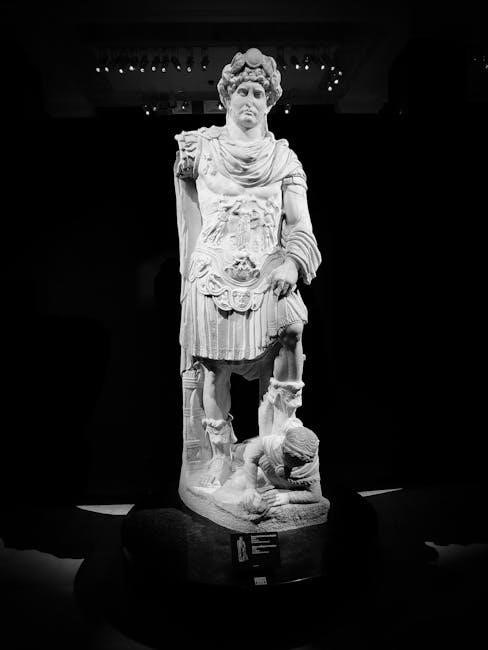
The Life and Reign of Marcus Aurelius
Marcus Aurelius ruled Rome with wisdom and justice, facing wars, plagues, and political turmoil. His reign is marked by resilience, embodying Stoic principles in leadership and personal life.
Marcus Aurelius’ Early Life and Education
Marcus Aurelius was born into a prominent Roman family, raised with a deep emphasis on philosophy and rhetoric; His early education focused on Stoic principles, shaping his future as a philosopher-king. Exposure to leading thinkers of his time, including Herodes Atticus and Claudius Maximus, further cultivated his intellectual and moral foundation. This upbringing instilled in him a commitment to virtue and self-discipline, which became central to his reign and writings. His formative years laid the groundwork for his ability to navigate life’s challenges with wisdom and equanimity, as detailed in Donald Robertson’s How to Think Like a Roman Emperor.
The Challenges of His Reign: Wars, Plagues, and Political Struggles
Marcus Aurelius faced immense challenges during his reign, including constant warfare with Germanic tribes, a devastating plague, and internal political turmoil. These struggles tested his leadership and Stoic principles. The Antonine Plague, which ravaged the empire, demanded swift and compassionate action. Additionally, external threats from invading tribes required strategic military responses. Despite these hardships, Marcus Aurelius remained committed to justice and wisdom, as documented in How to Think Like a Roman Emperor. His ability to navigate adversity with resilience and virtue exemplifies the Stoic ideal of enduring hardship with equanimity, leaving a legacy of strength and moral integrity.
His Role as a Stoic Philosopher-King
Marcus Aurelius uniquely embodied the ideal of a philosopher-king, blending political leadership with deep philosophical reflection. His reign exemplified Stoic principles, as he governed with wisdom, justice, and self-discipline. Through his writings in Meditations, he explored the tensions between ruling an empire and living in accordance with nature. Donald Robertson’s How to Think Like a Roman Emperor highlights how Marcus applied Stoicism to navigate the complexities of power, emphasizing the importance of virtue and emotional resilience. His dual role as emperor and philosopher left a lasting legacy, inspiring future leaders to integrate philosophy into their decision-making and daily lives.

Key Principles of Stoic Philosophy
Stoicism teaches living in harmony with nature, focusing on reason, self-control, and virtue. It emphasizes the dichotomy of control and cultivating emotional resilience to navigate life’s challenges wisely.
Virtue as the Highest Good
Central to Stoic philosophy, virtue is the highest good, encompassing wisdom, courage, justice, and self-discipline. In How to Think Like a Roman Emperor, Donald Robertson highlights Marcus Aurelius’ belief that living virtuously aligns individuals with nature and fosters inner peace. Virtue is not an abstract concept but a practical guide for decision-making and conduct; By prioritizing virtue, one cultivates a moral compass that navigates life’s complexities. This principle encourages individuals to act with integrity, regardless of external circumstances, embodying the Stoic ideal of a life well-lived in harmony with universal reason and natural order.
Understanding the Dichotomy of Control
The dichotomy of control, a cornerstone of Stoic philosophy, distinguishes between what is within our control and what is not. Epictetus famously taught that individuals should focus solely on the former. In How to Think Like a Roman Emperor, Donald Robertson illustrates how Marcus Aurelius applied this principle during his reign, prioritizing his responses to challenges rather than the challenges themselves. This mindset fosters resilience and clarity, allowing individuals to navigate adversity with equanimity. By embracing this dichotomy, one learns to direct energy toward what can be influenced, cultivating inner peace and effectiveness in both personal and professional realms, as highlighted in Robertson’s practical guide.
Cultivating Emotional Resilience
Cultivating emotional resilience is a central tenet of Stoic philosophy, enabling individuals to navigate life’s challenges with equanimity. In How to Think Like a Roman Emperor, Donald Robertson highlights Marcus Aurelius’ practices, such as morning and evening reflections, to strengthen emotional stability. These exercises encourage self-awareness, gratitude, and mindfulness, helping to manage negative emotions like anxiety or fear. By focusing on what lies within one’s control, individuals can build resilience and redirect energy toward constructive actions. This timeless wisdom, rooted in Stoicism, offers practical tools for modern life, empowering individuals to face adversity with clarity and emotional fortitude, as demonstrated by Marcus Aurelius’ own experiences as a philosopher-king.
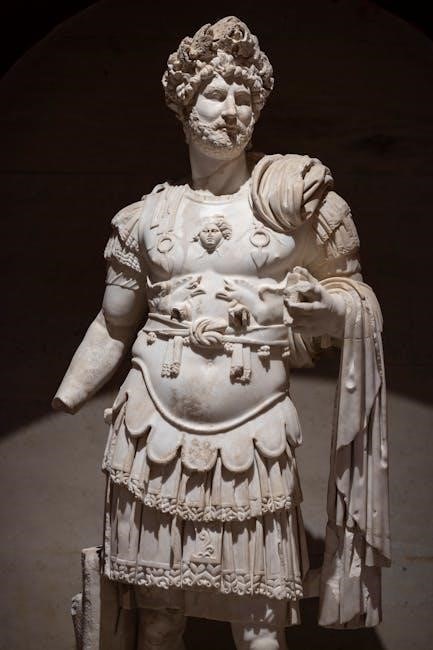
Practical Stoic Exercises from the Book
The book outlines exercises like morning reflections, gratitude practices, and cognitive techniques inspired by Marcus Aurelius’ teachings, helping readers apply Stoicism to daily challenges effectively.
Morning and Evening Reflections
Morning reflections involve setting intentions for the day, focusing on virtues like wisdom and resilience. Evening reflections review actions, identifying alignment with values and areas for improvement. These practices, inspired by Marcus Aurelius, help cultivate self-awareness and emotional balance, fostering a mindset of growth and accountability. By integrating these exercises, individuals can align their daily lives with Stoic principles, enhancing their ability to navigate challenges with clarity and purpose. Regular reflection becomes a powerful tool for personal development and living in harmony with nature.
Practicing Gratitude and Self-Awareness

Practicing gratitude and self-awareness are cornerstone Stoic exercises. Gratitude involves acknowledging and appreciating the good in life, no matter how small. This fosters a positive outlook and reduces dissatisfaction. Self-awareness, meanwhile, entails understanding one’s thoughts, emotions, and actions. By reflecting on these, individuals can identify patterns, align their behavior with values, and cultivate emotional resilience. These practices, rooted in Marcus Aurelius’ teachings, help individuals develop clarity and inner strength. Regularly practicing gratitude and self-awareness enables personal growth, enhances decision-making, and promotes a life lived in accordance with nature and virtue.
Overcoming Fear and Anxiety
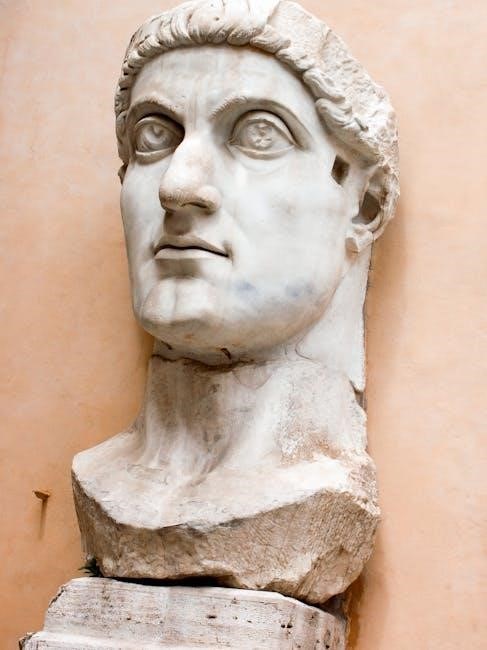
Overcoming fear and anxiety is a key aspect of Stoic philosophy, as emphasized in How to Think Like a Roman Emperor. The Stoics teach that fears and anxieties often stem from irrational thoughts and overemphasis on uncontrollable events. By practicing the dichotomy of control, individuals can focus on what they can influence and accept what they cannot. Cognitive behavioral techniques, inspired by Stoicism, help reframe negative thoughts and build resilience. Marcus Aurelius often reflected on his fears in his meditations, demonstrating how journaling and self-reflection can aid in processing emotions. These practices empower individuals to face challenges with clarity and calm, embodying the Stoic ideal of inner strength.
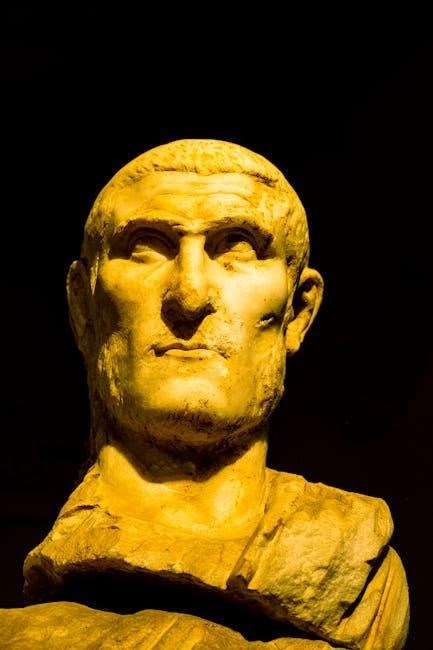
Modern Applications of Stoic Philosophy
Stoicism’s timeless wisdom resonates today, offering tools for personal growth, emotional resilience, and decision-making. Its principles align with modern therapies like CBT, fostering mental clarity and inner strength.
Stoicism in Personal Growth and Decision-Making
Stoicism empowers personal growth by fostering self-awareness, emotional regulation, and rational decision-making. By focusing on what one can control, individuals can cultivate resilience and clarity. How to Think Like a Roman Emperor illustrates how Marcus Aurelius’ philosophy can guide modern individuals in navigating life’s challenges. The Stoic approach encourages aligning actions with core values, helping people make decisions that promote long-term well-being. Its emphasis on virtue and mindfulness enables individuals to embrace adversity as a growth opportunity, fostering inner strength and wisdom. This timeless philosophy remains a powerful tool for personal development and ethical decision-making in today’s fast-paced world.
Building Emotional Resilience in the Modern World
Stoicism offers timeless strategies for building emotional resilience, enabling individuals to navigate modern challenges with equanimity. By distinguishing between what is within and beyond one’s control, people can focus on their responses rather than external events. How to Think Like a Roman Emperor highlights how Marcus Aurelius used Stoic principles to manage stress and uncertainty. Techniques like mindfulness, reflection, and gratitude help cultivate emotional strength. Robertson’s book provides practical exercises to apply these teachings, empowering readers to face adversity with courage and wisdom. Stoicism’s emphasis on inner stability makes it a powerful tool for thriving in today’s demanding world.
Stoicism and Cognitive Behavioral Therapy (CBT)
Stoicism and Cognitive Behavioral Therapy (CBT) share a common goal: transforming negative thought patterns into constructive ones. How to Think Like a Roman Emperor reveals how Marcus Aurelius’ philosophical practices align with CBT techniques. Both emphasize identifying and challenging unhelpful thoughts, focusing on what is within one’s control. Robertson’s book illustrates how Stoic exercises, such as journaling and reflection, parallel CBT’s structured approach to emotional management. This fusion of ancient wisdom and modern psychology offers a powerful framework for overcoming anxiety, managing stress, and fostering mental clarity. By integrating these methods, individuals can build resilience and improve their overall well-being in a practical and enduring way.

How to Think Like a Roman Emperor: Key Takeaways
How to Think Like a Roman Emperor offers a blend of biography and philosophy, providing practical Stoic exercises to build emotional resilience and live virtuously today.
Embracing Adversity as a Path to Growth
Marcus Aurelius faced immense challenges, including wars, plagues, and personal loss, yet he viewed adversity as a natural part of life. Through Stoicism, he learned to accept difficulties as opportunities for growth. In How to Think Like a Roman Emperor, Donald Robertson highlights how Marcus transformed suffering into strength by focusing on what he could control. This mindset teaches us to embrace adversity as a teacher, fostering resilience and wisdom. By aligning our actions with virtue and reason, we can turn obstacles into stepping stones for personal development, just as Marcus Aurelius did during his reign.
Cultivating Inner Strength and Wisdom
Marcus Aurelius’ writings reveal his commitment to self-reflection and mental discipline. Through journaling and Stoic exercises, he cultivated inner strength and wisdom, even amidst turmoil. How to Think Like a Roman Emperor by Donald Robertson shows how Marcus used philosophy to navigate life’s challenges, emphasizing the importance of aligning actions with virtue. By practicing mindfulness and focusing on what truly matters, we can build resilience and clarity. The book offers practical CBT-inspired techniques, helping readers develop the same mental fortitude that defined Marcus’ reign. His wisdom teaches us to grow through self-awareness and unwavering commitment to our values.
Living in Accordance with Your Values
Marcus Aurelius’ philosophy underscores the importance of living in harmony with your values. He believed in aligning actions with virtue and reason, rejecting external pressures that conflict with inner principles. How to Think Like a Roman Emperor highlights how Marcus navigated his reign by steadfastly adhering to Stoic ideals, even in adversity. By prioritizing integrity and purpose, he demonstrated that true fulfillment comes from living authentically. The book encourages readers to identify and uphold their core values, fostering a life of moral clarity and inner peace. This timeless wisdom reminds us to stay grounded in our principles, regardless of life’s challenges.
Donald Robertson’s How to Think Like a Roman Emperor masterfully bridges ancient Stoic philosophy with modern life, offering timeless wisdom for personal growth and resilience.
The Timeless Relevance of Stoicism
Stoicism, as explored in How to Think Like a Roman Emperor, remains a powerful philosophy for modern life. Its teachings on virtue, resilience, and living in harmony with nature transcend time. By focusing on what we can control and cultivating inner strength, Stoicism offers practical tools for navigating life’s challenges. The philosophy’s emphasis on reason and self-awareness aligns with contemporary psychological practices like CBT. Robertson’s work highlights how Marcus Aurelius’ wisdom can guide us in fostering emotional resilience and making decisions aligned with our values, proving Stoicism’s enduring relevance in today’s fast-paced world.
Applying Marcus Aurelius’ Wisdom in Daily Life
Marcus Aurelius’ teachings, as shared in How to Think Like a Roman Emperor, provide a roadmap for integrating Stoic principles into daily life. By practicing gratitude, reflecting on actions, and embracing adversity, individuals can build emotional resilience. Robertson’s book offers practical exercises, such as morning and evening reflections, to help readers align their thoughts and actions with Stoic values. These practices foster a mindset of clarity, enabling individuals to face challenges with equanimity and make decisions grounded in virtue. Aurelius’ wisdom, as presented by Robertson, serves as a powerful guide for living a purposeful and fulfilling life in the modern world, offering timeless insights for personal growth and well-being.
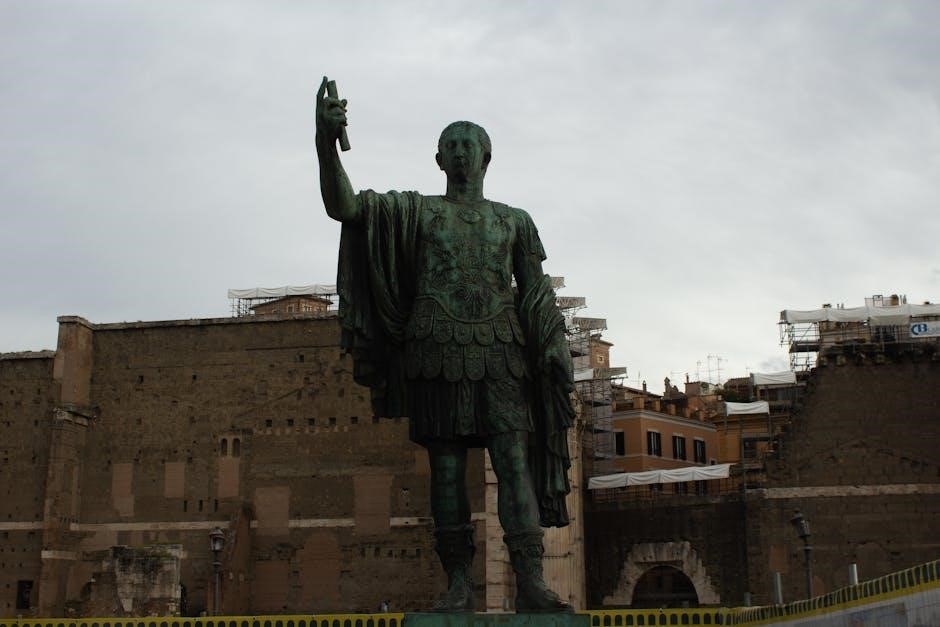
Free PDF Summary and Resources
A free, illustrated PDF summary of How to Think Like a Roman Emperor is available, offering key insights and practical Stoic exercises for daily application.
Downloading the Illustrated PDF Handbook
The illustrated PDF handbook, created by Donald Robertson, offers a concise overview of How to Think Like a Roman Emperor. This 14-page guide, designed with the help of graphic designers, provides key insights into Marcus Aurelius’ life, Stoic principles, and practical exercises. It serves as a companion to the book, making the philosophy accessible and actionable. The handbook is available for free download, allowing readers to explore Stoic wisdom and apply it to modern life. Visit Donald Robertson’s website to access this valuable resource and deepen your understanding of Stoic philosophy.
Additional Resources for Further Learning
Beyond the PDF summary, explore more resources to deepen your understanding of Stoicism. Donald Robertson offers an online course on Marcus Aurelius’ life and philosophy, providing structured lessons and exercises. His website features articles, podcasts, and additional guides, such as How to Think Like Socrates, which complements Stoic teachings. For a comprehensive dive, read Robertson’s biography Marcus Aurelius: The Stoic Emperor. These resources, along with the original book, create a robust learning path for those seeking to embrace Stoic principles in their daily lives and cultivate emotional resilience.

Final Call to Action
Embark on your Stoic journey today with How to Think Like a Roman Emperor. Download the free PDF guide, share insights, and transform your life with timeless wisdom.
Start Your Stoic Journey Today
Begin your path to emotional resilience and wisdom with How to Think Like a Roman Emperor. This book seamlessly combines biography and philosophy, offering practical Stoic exercises. Each chapter explores Marcus Aurelius’ life, his application of Stoic principles, and actionable CBT-based practices. Download the free illustrated PDF handbook to complement your journey. Share your thoughts and experiences with others, fostering a community of growth. By embracing Stoicism, you’ll discover how to face adversity with courage and live in alignment with your values. Take the first step toward a more fulfilling life today.
Share Your Thoughts and Experiences
Engage with others by sharing insights from How to Think Like a Roman Emperor. Discuss the book’s practical Stoic exercises and how they’ve impacted your life. Join communities or forums to exchange ideas on applying Marcus Aurelius’ wisdom in modern contexts. Your reflections can inspire others and deepen your own understanding. Share your journey on social media or with friends, fostering a collective growth mindset. By participating in these conversations, you contribute to a broader dialogue on Stoicism’s relevance today. Let your experiences enrich the global discussion sparked by Donald Robertson’s work.